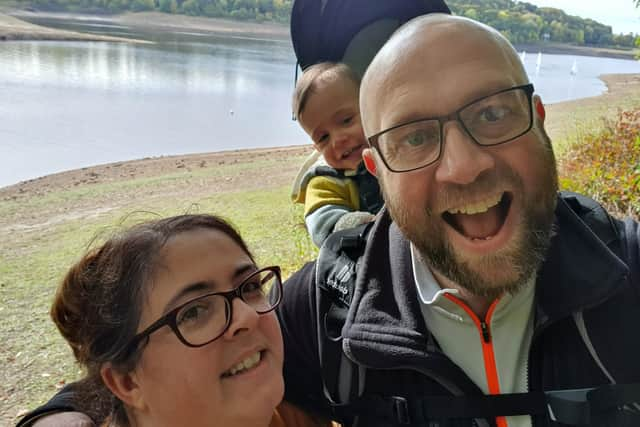Widower tells of heartbreak after wife's migraine-like symptoms turned out to be deadly blood clot
Natasha Hewitt, 35, was given antibiotics and painkillers for a suspected ear infection by doctors after she attended a walk-in centre. Two days later, she was admitted to hospital where she was diagnosed with a large blood clot called a cerebral venous sinus thrombosis. She was transferred to specialist brain unit for surgery, but tragically died two days later.
Speaking for the first time since Natasha's death, her husband Nick, 42, said: "Everything seemed perfect. We were actually trying for another baby. However, that all changed when Natasha started complaining of feeling poorly last December. The last time I saw Natasha open her eyes was when she was transferred. We hoped and prayed that she would pull through but sadly she didn't.
Advertisement
Hide AdAdvertisement
Hide Ad"We got to spend our last final moments together. It was absolutely awful feeling her hand go cold and the colour in her face change, I wouldn't wish it upon anyone. Natasha was a beautiful soul, there was no bad in her; just a kind and caring person."


Natasha, of Sheffield, first complained of pain which had moved from her back and into her head and left ear on Sunday, December 11 last year. She took strong painkillers and managed to go Christmas shopping with Nick and their baby son, Harry. During their last shopping trip together, the couple bought Harry his first pair of shoes. Her pain continued and she had migraine-like symptoms and struggled to stand up without feeling dizzy.
The following Wednesday, she attended a walk-in medical appointment at which she was prescribed antibiotics and painkillers for a suspected ear infection. Two days after first being prescribed antibiotics, Natasha - who had a history of blood clots - was admitted to hospital.
Natasha, who was studying for a business management with accounting degree through the Open University, was transferred for specialist surgery later that day. Surgeons operated on Natasha to relieve pressure on her brain on Saturday, December 17. She died at around 1am the next morning.
Advertisement
Hide AdAdvertisement
Hide AdHeartbroken Nick added: "Natasha sought medical advice but she didn't seem to be improving; in fact she looked to be getting worse. Natasha was unable to look after Harry and I felt powerless to help her. It got to the point where I thought enough was enough and she needed to go to hospital.
"She couldn't stand up, she was vomiting, her speech was confused. She couldn't even keep water down. After arriving at hospital I was taken into a small room and offered a hot drink. That's when I knew how serious it was. I sat at her bedside was speaking to her as she was unresponsive. I held her hand and cried whilst saying 'I'm so sorry'."
Natasha and Nick had suffered 11 miscarriages and two failed rounds of IVF before they found out they were expecting Harry. She was diagnosed with a blood clot in her placenta at 25 weeks pregnant and doctors took the decision to deliver Harry 14 weeks premature in July 2021.
The following month, Natasha, also received hospital treatment for a blood clot on her lung. Harry spent 18 weeks in neonatal intensive care before he was allowed home to his parents.
Advertisement
Hide AdAdvertisement
Hide AdNick, who has now instructed medical negligence lawyers to investigate Natasha's death, added: "We thought it wasn't meant to be but then suddenly found out Natasha was expecting. We were overjoyed. When Harry was born there were some really tough and emotional times, but he showed amazing fight. We were so excited to bring him home to start our life as a family together.
"Harry was making amazing progress and developing. We'd have a family day every week where we'd go swimming, go to the park or go for a long walk."
An inquest into Natasha's death is due to take place this week, expected to last two days.
Rosie Charlton, the specialist medical negligence lawyer at Irwin Mitchell representing Nick, said: "While nothing can bring Natasha back, the inquest is a major milestone in being able to provide them with the answers they deserve "Blood clots can be incredibly serious and need to be treated quickly. If during the course of the inquest any issues in the care Natasha received are identified, it's vital that lessons are learned to improve patient safety."